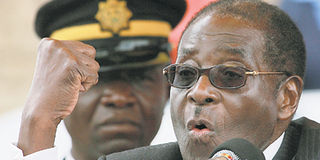Zimbabwe set to introduce its representation currency

Zimbabwe’s President Robert Mugabe addresses civillians on the outskirts of the capital Harare . PHOTO | FILE
What you need to know:
- The Reserve Bank of Zimbabwe (RBZ) announced on Saturday that local banks would start dispensing the bond notes while a law was still being debated by Parliament to make them legal tender.
- Clients would be limited to withdrawals of $150 a month, RBZ said.
- “The bond notes will be released into the market through normal banking channels in small denominations of $2 and $5,” the RBZ said in a statement.
Harare. Zimbabwe will on Monday introduce its token currency that is pegged to the US dollar as the country battles to end cash shortages that began almost a year ago.
The Reserve Bank of Zimbabwe (RBZ) announced on Saturday that local banks would start dispensing the bond notes while a law was still being debated by Parliament to make them legal tender.
Clients would be limited to withdrawals of $150 a month, RBZ said.
“The bond notes will be released into the market through normal banking channels in small denominations of $2 and $5,” the RBZ said in a statement.
“The initial release of bond notes shall be in an amount of $10 million in denominations of $2 and $2 million in $1 coins.
The bond notes would circulate alongside a basket of currencies that include the US dollar and the South African rand.
“The banking public is advised that no new accounts will be opened as the bond notes would be deposited into existing US dollar accounts,” RBZ said.
“In line with the bank’s thrust to promote a less cash society through the, use of plastic money, withdrawal limits of bond notes have been set at am maximum of $50 per day and a maximum of $150 per week.”
Zimbabweans have been struggling to access their money from banks, forcing many to sleep in bank queues.
However, the introduction of the bond notes has been facing fierce opposition from Zimbabweans who fear that it was an attempt to re-introduce the local currency that was scrapped in 2009 in favour of a multi-currency system.
The country was forced to scrap the Zimbabwe dollar after it was ravaged by inflation that peaked at 500 billion per cent.
Zimbabwe has experienced a number of cash shortages since the turn of the millennium, resulting in the closure of many banks. (NMG)



